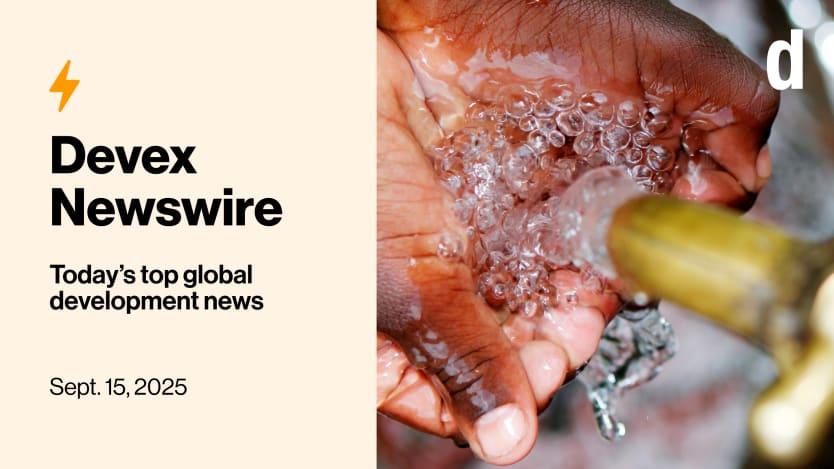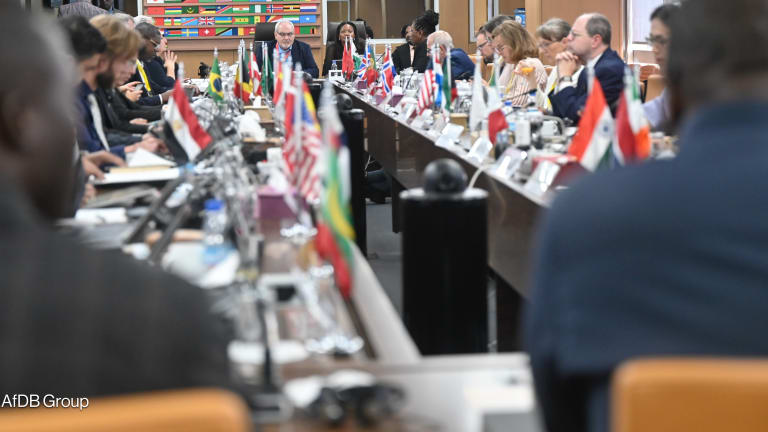Presented by World Health Summit

Water, sanitation, and hygiene, or WASH, is fundamental to life and essential to development, serving as the connective issue for a web of sectors from health to education to equality. So why is it consistently relegated to the sidelines?
Also in today’s edition: The African Development Fund has its eyes on capital markets to drum up an unprecedented amount of money for its replenishment this year.
+ Happening tomorrow: As countries head into the 80th U.N. General Assembly this month against the backdrop of a world order in flux and a United Nations on the brink, we’re bringing a panel of U.N. and global affairs experts for a Devex Pro briefing to offer an in-depth preview of this major moment and what it means for development professionals. Register now to take part in the discussion.
Don’t WASH your hands of it
Water is life — you aren’t going to last long without it. But safe drinking water, along with sanitation and hygiene, also stands at the nexus of development in ways we don’t always appreciate.
Simple waterborne diseases such as cholera and diarrhea still kill millions. At least 10% of the world’s population is thought to consume food irrigated by wastewater. A lack of menstrual products forces girls to miss school, depriving them not only of an education, but a country of future economic growth.
The scale of the problem is massive. Globally, an estimated 1 in 4 people lack access to safely managed drinking water, while 3.4 billion people live without safe sanitation. Yet, WASH is chronically underfunded compared to other areas of development — a deficit exacerbated by today’s sweeping aid cuts.
Why?
While the acronym is simple, WASH solutions are not — and experts have debated them for years. One hypothesis comes down to a divisive moral question: Should water be treated as a human right or an economic commodity?
“Of course it’s a human right, as is food. But no one argues that you shouldn’t pay a bit of money for food,” says Tim Wainwright of WaterAid. But governments don’t always like to pay up for it, and the private sector is often hesitant to invest in it.
One reason could be that WASH is its own worst enemy. The World Bank estimates that for every dollar given, WASH spends just 72% of its budget due to poor productivity and a lack of efficiency. “How can you be advocating for more money when you’re not even spending the money you have?” says Joel Kolker, the former global lead for water and finance at the World Bank.
Another potential culprit? High-income countries haven’t felt the urgency of a water shortage and are less likely to invest time and money into it.
“I think there’s an awful lot of people who work in development that assume water is okay and therefore go do more complicated things,” Wainwright says.
But solutions are being tested, from public-private partnerships to bonds and blended finance.
Alix Lebec, who focuses on innovating finance and philanthropy, believes the investment potential is there — but perceptions are holding it back.
“There’s always been this misconception that people living in poverty are a problem to be solved versus a market to be served,” she says.
Read: Water and sanitation fall through the cracks of development
Flush without cash
Another reason WASH is so important: dignity — and dollars. That’s where the humble toilet comes in, writes Kinya Seto, president and CEO of LIXIL, which specializes in water and housing products, in a Devex opinion piece.
Seto argues that while “grandiose” ideas such as artificial intelligence and automation promise vast economic benefits for Africa, “what if Africa’s next economic catalyst was far simpler?” he writes, calling improved sanitation an “untapped opportunity to empower and grow Africa’s economy that can be realized today.”
Seto’s company produces high-tech toilets that cost $5,000. But he says he’s proudest of the impact its $5 toilet that functions off grid is having across Africa.
Opinion: How a humble toilet can help accelerate growth in Africa
Capital idea
The replenishment of the International Development Association, or IDA, the World Bank’s concessional lending arm for the lowest-income countries, got plenty of press last year. But there’s another consequential lending arm for poorer countries — the African Development Fund — that’s set for a big replenishment this year.
Momentum is building for ADF, which falls under the African Development Bank, on two fronts: tapping capital markets and fresh discussions about welcoming nonsovereign contributors for the first time, my colleague Ayenat Mersie writes.
The previous replenishment round brought in a record $8.9 billion, but surpassing that in today’s aid-deprived climate will require new approaches.
Going to capital markets — or issuing bonds to raise money from investors, as IDA does — would allow ADF to raise up to $5 billion for a three-year replenishment cycle.
Currently, 67% of ADF shareholders — the largest of which include Nigeria, the United States, and South Africa — have signed off on allowing the fund to tap capital markets, said AfDB’s Valerie Dabady, speaking to Ayenat on the sidelines of the Africa Climate Summit in Ethiopia last week. The threshold for approval is 75%, with the deadline set for Dec. 31, 2025. Dabady said she was confident they would get there.
But ADF still relies heavily on contributions from donor countries, so while capital markets could increase resources, they can’t do all the heavy lifting.
“What we’ve seen from IDA going to the capital markets is the risk that donors essentially think that you’re a self-managing machine,” Dabady cautioned. “Market access doesn’t take away the need to have grant funding. And grant funding typically comes from donors.”
Read: New contributors and market access inch onto ADF’s agenda
Related: New AfDB president inherits a bigger bank — and tougher challenges
A new start?
Last week, the Millennium Challenge Corporation and officials from Côte d’Ivoire signed a regional energy compact, a large grant agreement aimed at improving West Africa’s energy security and reducing its energy costs.
“This compact reflects [U.S.] President [Donald] Trump’s commitment to smart, accountable development that advances U.S. interests. A stronger energy sector in West Africa creates new markets for American companies, supports U.S. jobs, and contributes to regional stability that benefits us all,” said U.S. Deputy Secretary of State Christopher Landau.
The project was first approved by the MCC board last year and the signing marks one of the first formal actions that the agency has taken during the second Trump administration. It’s perhaps a sign that after months of questions about MCC’s future, some projects are moving forward.
The new grant comes on the heels of a previous $500 million compact focused on education and transportation infrastructure that wrapped up its operations last month. MCC staff will be in Abidjan this week to mark the end of the first compact and the signing of the new regional agreement.
ICYMI: MCC board approves projects, terminates others at much-anticipated meeting
Ta, Finland
Technical assistance, or TA, is critical to the development sector, though there isn’t exactly a hiring spree to bring on TA specialists — or any other kind of specialists for that matter — in the wake of across-the-board aid cuts.
That’s in part why it’s notable — and welcome — that Finnfund, Finland’s development finance institution, is for the first time offering dedicated funding for technical assistance thanks to a new pot of money provided by the European Union.
Finnfund is preparing to roll out a significantly expanded technical assistance portfolio of about €15 million in the upcoming years, my colleague Raquel Alcega writes.
Learn more about how this shift will generate new consulting opportunities by watching a Devex Pro Funding session with Juho Uusihakala, senior development impact adviser at Finnfund.
Read: Technical assistance at Finnfund — what consultants need to know (Pro)
+ A Devex Pro membership offers deeper analysis of the evolving development sector, exclusive events and conversations with sector leaders on timely issues facing the aid world, access to the world’s largest global development job board for career resources, and more. Try it out today by signing up for a 15-day free trial.
In other news
The U.N. General Assembly approved on Friday a declaration calling for a two-state solution that condemns both Hamas’ Oct. 7, 2023, attacks and Israel’s actions in Gaza, while demanding the war end, even as the U.S. and Israel denounced the resolution as unhelpful. [Reuters]
A UNICEF official, one of the 19 U.N. staffers detained by Houthis last month, was released and on Thursday returned home to Jordan. [AP]
The U.N. has condemned a reported massacre in the Haitian fishing village of Labodrie, where at least 40 people were killed and the village set ablaze by armed gangs following the killing of a gang leader, as violence spills outside Port-au-Prince. [The Guardian]
Sign up to Newswire for an inside look at the biggest stories in global development.








